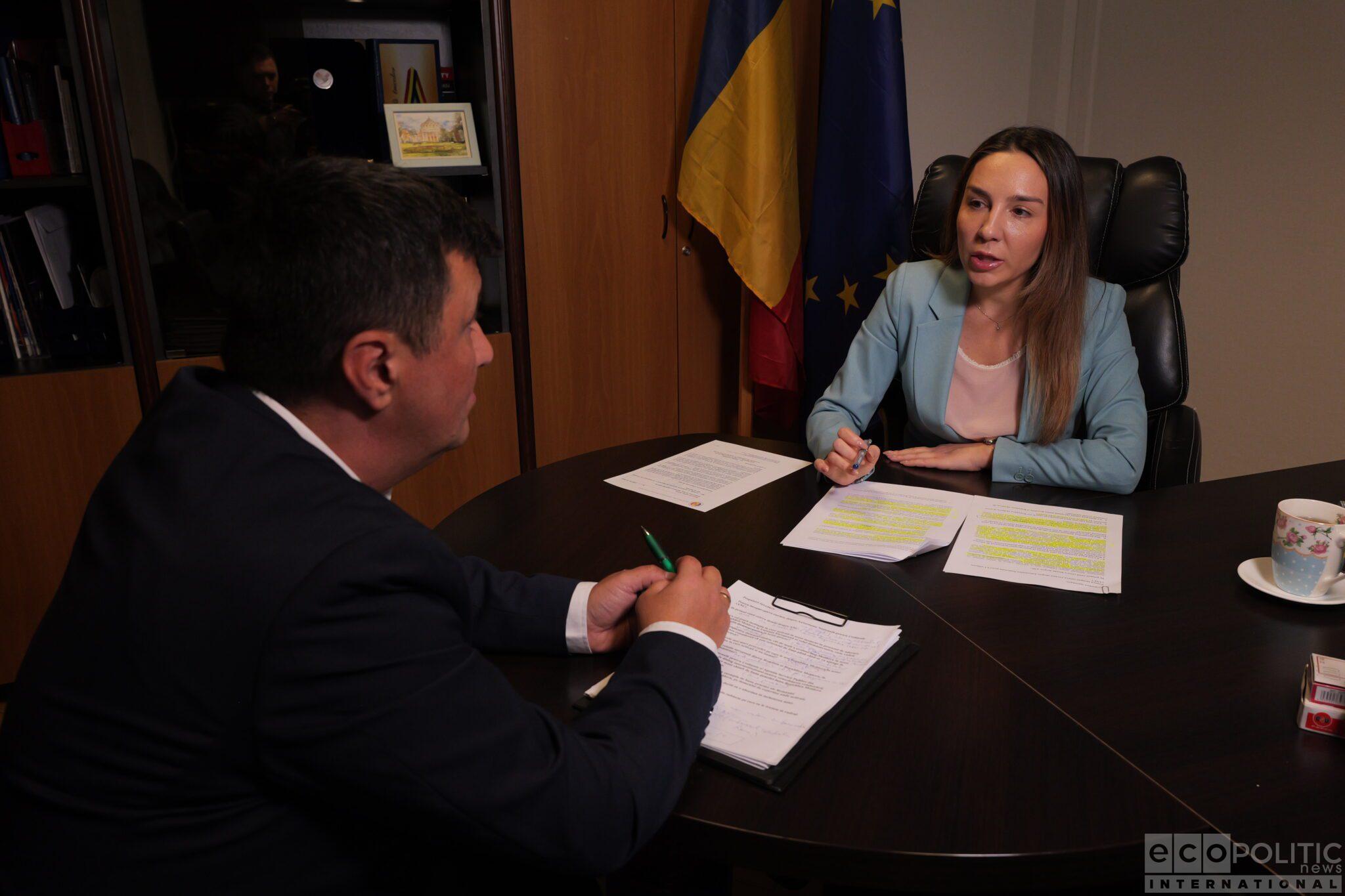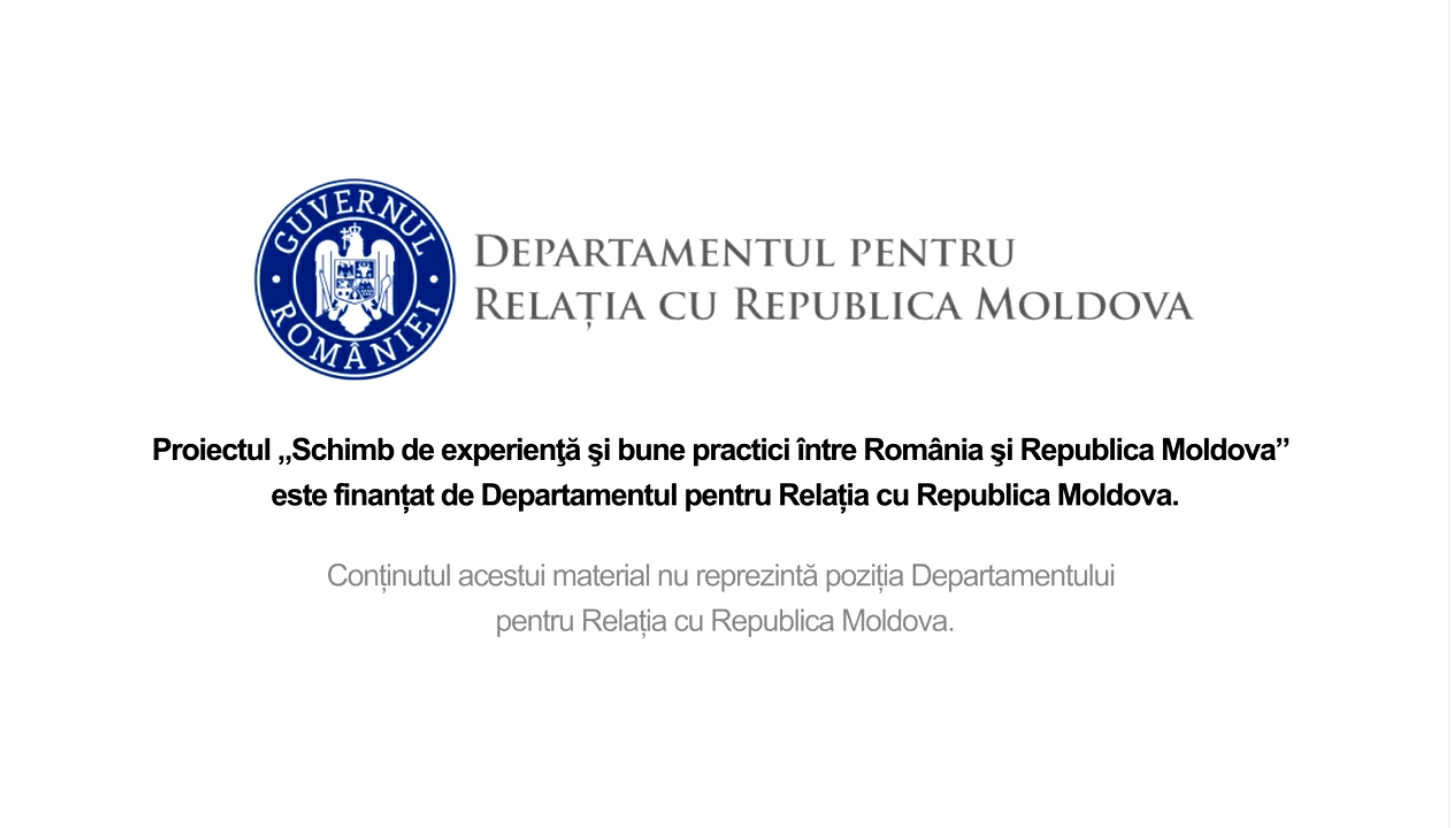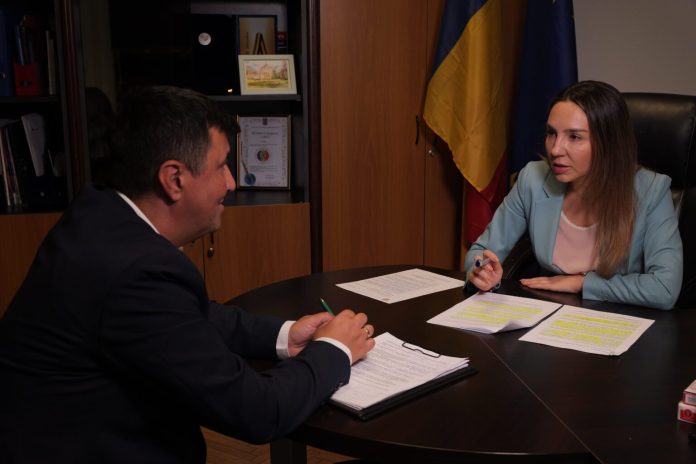Claudia Țapardel, President of the National Authority for Citizenship (ANC), gave an interview to ecopolitic.ro, as part of the project „Exchange of experience and good practices between Romania and the Republic of Moldova,” funded by the Department for Relations with the Republic of Moldova, in which she shared some details about her work in this position, good practices, and collaboration with institutions in Romania to help the Republic of Moldova integrate into the EU and beyond.
- Claudia Tapardel: I believe that Romania will maintain its status as an advocate at European level for the faster integration of the Republic of Moldova into the EU (…) 740,000 Moldovan citizens have become and regained Romanian citizenship, also becoming citizens of the Romanian state.
Iulian Ionescu ecopolitic.ro: Please tell us a few details about the work of this institution—the National Authority for Citizenship—including in your area as a former MEP, because I understand that there are many links between the two areas.
Claudia Tapardel: First of all, welcome to the headquarters of the National Authority for Citizenship. I consider it to be one of the most important, essential, and even strategic institutions of the Romanian state. I am honored to have taken over the duties of president of the National Authority for Citizenship almost two weeks ago, having worked in this institution as vice president for about a year and a half, so I am familiar with what this institution does. It is an institution of national interest, under the authority of the Ministry of Justice, whose purpose is to grant, withdraw, or restore Romanian citizenship. I believe that Romanian citizenship is the essential element on which a state is founded, namely the citizens of that state. Whether they are citizens by right, who were born Romanian citizens by right, or citizens who, according to Romanian citizenship law, regain Romanian citizenship.
In the case of Article 11, and here I am referring to historical reparation for the former Romanian territories, we are referring in particular to the citizens of the Republic of Moldova, but there are also other territories that belonged to the Romanian state in the past, whether we are referring to Article 10, where we have Romanian citizens who lost, for reasons not attributable to them, in the vast majority of cases for political reasons, and here I am referring to the period when, with the departure from Romanian territory during the communist era, Romanian citizenship was lost according to the law, and we are also making this historical reparation. And Article 8 of the Romanian Citizenship Law, through which we effectively grant Romanian citizenship to foreign citizens who wish to acquire it, because Romanian citizenship is an attribute of the sovereignty of the Romanian state and a vocation for those who obtain it, who wish to become citizens of the Romanian state. We also have Article 8.1 for foreign citizens who make an important contribution to the development of Romanian culture and the Romanian state.
So, I believe that this institution is very important, and we hope that through its work we will bring valuable Romanian citizens into the Romanian community and strengthen the Romanian state, citizens who bring value and contribute to the development of the Romanian state, because, if I may refer to my former status as a member of the European Parliament, it is an honor, but also a great benefit, I would say, to become a Romanian citizen, because along with the rights you gain as a Romanian citizen, there are also a number of rights you gain as a European citizen. And here we are referring to the four fundamental freedoms offered by European citizenship, and I believe that it is a great advantage for any citizen from outside the European Union who becomes a Romanian citizen.
At the same time, as vice-president who has taken over the duties of the president of the National Authority for Citizenship, I can say with confidence that citizens who become Romanian citizens, foreign citizens who become Romanian citizens, must understand that beyond these rights and benefits to which they are entitled, there are also a number of responsibilities that any citizen of a state must take into account.
And I believe that this is a great benefit for any foreign citizen from outside the European Union, who, upon obtaining Romanian citizenship, also becomes a European citizen with the right to travel within the Schengen area, with the right to work within the single European area and to carry out activities within the European community.
Reporter: I assume that many Moldovan citizens currently have dual citizenship, meaning they also have Romanian citizenship. What role does the National Authority for Citizenship play in the process of Moldova’s accession to the European Union, taking into account the collaboration with institutions there?
Claudia Tapardel: Absolutely. Since you asked and mentioned that there are many Moldovan citizens who also have Romanian citizenship and have obtained Romanian citizenship, I will give you some statistics, because I always like to speak in concrete terms.
So, since the establishment of the National Authority for Citizenship in 2010, we have had 833,000 applications for the reacquisition of Romanian citizenship under Article 11 of the Romanian Citizenship Law, which I mentioned earlier.
Of these nearly 833,000, 835,000, we currently have 740,000, 739,000 to be exact, approved applications. So, 739,000–740,000 Moldovan citizens have become or regained Romanian citizenship, becoming citizens of the Romanian state.
In the last five years, to move towards, let’s say, a more recent period, approximately 205,000 applications of this type have been submitted by Moldovan citizens, and most of them have been approved. Obviously, we also have decisions not to grant Romanian citizenship in cases where the documents submitted did not meet the criteria established by the legal framework of Romanian citizenship law.
Obviously, we are trying, both our institution and the institution that coordinates us, the Ministry of Justice, to support the process of Moldova’s accession to the European Union, and I believe that from the very beginning, that is, since 2022, when Moldova obtained the status of a candidate country for the European Union, and subsequently, since June 2024, when negotiations on the 35 negotiation chapters actually began, the Republic of Moldova has benefited from the full support and assistance of the Romanian state, and of course from the support and assistance of the Ministry of Justice. in fact, there is also an action plan in the field of justice between the Ministry of Justice of Romania and the Ministry of Justice of the Republic of Moldova for the period 2025-2027, precisely with the aim of supporting the Ministry of Justice of the Republic of Moldova in integrating, so to speak, the elements of the acquis communautaire into the legislation of the Republic of Moldova, and we have gone through this process of negotiation and integration of European legislation, namely the acquis communautaire, into national legislation. In fact, our support focuses on the two chapters dedicated to justice, chapters 23 and 24, chapter 23 (Justice and Fundamental Rights), Chapter 24 (Justice, Freedom, and Security), we work very closely with the Public Services Agency of the Republic of Moldova, we support each other in this process of granting citizenship to Moldovan citizens who become Romanian citizens, we request, we have correspondence and inter-institutional cooperation through which we verify civil status documents and other documents required by Romanian law for the granting of citizenship.
Reporter: I suppose that in recent years there has also been an evolution and an upgrade in relations…
Claudia Tapardel: This relationship is very close, we also have a memorandum of cooperation signed with the Public Services Agency of the Republic of Moldova, and last year we signed an addendum through which we want to further strengthen our cooperation and streamline the transfer and communication of essential information, especially that related to civil status documents between the Romanian state and the Republic of Moldova.

Reporter: What would you consider to be an example of good practice at the level of the institution you lead or the Ministry of Justice?
Claudia Tapardel: There is collaboration between our institution and the Ministry of Justice and between our institution and the Ministry of Internal Affairs because here in Romania we are part of a system of inter-institutional collaboration, especially since, as I said, it is an institution of essential importance for the Romanian state, both in terms of integrating new citizens into the Romanian community and in terms of protecting the Romanian state and the security of the Romanian state and the entire Schengen area, if we broaden our vision a little. But there are discussions about offering our experience and expertise in streamlining population registration systems. I understand that there have been discussions and contributions, particularly from the Ministry of Internal Affairs, regarding identity cards and electronic identity cards, and I understand that we have also made some recommendations.
It is also evident that we focus heavily on our area of expertise regarding the granting of Romanian citizenship and, of course, we offer our expertise to the Republic of Moldova in granting Moldovan citizenship to other foreign citizens who wish to obtain Moldovan citizenship.
We also work closely with the ambassador and, of course, if we extend our activities from the National Citizenship Authority to the entire Romanian state, we are certainly probably the most important advocate at European level for the integration of the Republic of Moldova into the European Union, so that this process is as rapid and efficient as possible, and I believe that Ms. Maia Sandu, the President of the Republic of Moldova, said that we are a staunch advocate defending the interests of the Republic of Moldova in Brussels, and I believe that this heartfelt relationship of friendship and brotherhood that we have with the Republic of Moldova is evident in all the actions taken by Romanian officials and the Romanian state to support the Republic of Moldova in this process of accession and integration into the European Union.
Reporter: In the context of what is happening at the moment, it is a rather difficult period for us, for the Republic of Moldova, for Europe, and for the whole world. From your point of view, in the area in which you work, what would you say are the biggest challenges facing the Republic of Moldova at the moment?
Claudia Tapardel: Well, if we focus in particular on what we discussed earlier in this process of integration into the European Union and negotiation on chapters, then I will focus on chapters 23 and 24 – Justice, Fundamental Rights and Justice, Freedom and Security, which are essential chapters, including, as I said, the integration of the acquis communautaire. There is a major challenge, especially in this rather complicated and oppressive geopolitical context, and this is either a tendency towards pressure and fatigue in the reform process, because, clearly, as we have experienced in Romania, intensive and sustained reform is needed at the level of the Moldovan state, or at the same time it may also be a tendency to relax the reform process.
I am obviously speaking from my experience as a Member of the European Parliament.
I have also analyzed the accession processes of other Member States, the stages they have gone through, and we all know that the requirements at European level are non-negotiable, so to speak, and that in a way they give solidity to the European structure. On the other hand, for a country in the process of accession and integration, which has to implement all these reforms in order to reach the level of requirements imposed by the European treaties, it is not an easy path. It requires consistency and firmness on the part of the state, but also acceptance on the part of its citizens.
Reporter: In any case, it is clear that every institution, every department in Romania can provide examples of good practice for the Republic of Moldova…
Claudia Tapardel: Absolutely. And I was actually thinking before giving you this interview that there are many people who have excelled professionally in Romania and who now work or hold important positions in the Republic of Moldova, and I think it is a very wise move on the part of the Republic of Moldova to exchange know-how, professional experience, and experienced human resources from Romania. And we are glad that there are Romanian professionals who support this process of integration and accession of the Republic of Moldova, working effectively for the Republic of Moldova and supporting this endeavor, which, incidentally, we have always supported. That is, for the Republic of Moldova to become a member state of the European Union alongside us.
In any case, we are probably the state that has supported the Republic of Moldova in every way, both with technical assistance and expertise, as well as with effective financial support, to ensure that the Republic of Moldova is a state that continues on its European path.
Iulian Ionescu ecopolitic.ro: Especially since we know that we had problems integrating into the European Union, we now know that we must not make certain mistakes or do certain things…
Claudia Tapardel: The Republic of Moldova now benefits from all the know-how, all the expertise, the best practices, the „to do and not to do” in the reform process, and I think that is very important. And anyway, the interinstitutional and intergovernmental dialogue between Romania and the Republic of Moldova is ongoing, regardless of the government or who has been in charge, from the president to the government, even interparliamentary cooperation, it has always been a sustained, honest, loyal cooperation on the part of both states, and it will certainly continue to be so in the future.
Iulian Ionescu ecopolitic.ro: Finally, what message do you have for Romania and the Republic of Moldova in the context of cooperation and good practices between the two countries?
Claudia Tapardel: You should know that we, at the level of the Romanian state and the Ministry of Justice, and now, coming right into my backyard, the National Authority for Citizenship, are focusing heavily on evolving, to demonstrate greater efficiency and performance in analyzing and resolving citizenship cases. I can tell you that right now, we are working intensively and we want to computerize and create a new IT system for the process of granting Romanian citizenship, in which we will have a very clear and coherent flow of the citizenship granting process from the moment the citizenship application is registered until the moment the citizenship file is actually resolved and the oath to the Romanian state is taken.
We want an efficient, digitized system that is fit for the 21st century. We have accessed funds from the National Resilience and Recovery Plan worth €1.5 million, and I expect that once this project is implemented and completed, we will have an efficient, high-performance, fully digitized system for granting Romanian citizenship. And I believe that, obviously, in the future, because I am convinced that it will be a successful project, we can share these good practices with the Republic of Moldova, with the Public Services Agency of the Republic of Moldova.
I believe that any state and any government institution, at a time when digital and technological evolution is so rapid, must update itself as quickly as possible.
At the same time, as a final message, as the head of this institution, I can say this. My duty as the head of this institution is to have an institution that performs well, that is efficient, where the work process is in the interest of Romanian citizens first and foremost, and of the Romanian state, but also of citizenship applicants. At the same time, we want to offer Romanian citizenship to future Romanian citizens who honor the Romanian state and the Romanian community and who improve and add value to this state. Because, as I mentioned at the beginning of the interview, the benefits and advantages offered by Romanian citizenship are countless, they are valuable, and I believe it is important that applicants for citizenship understand, from the moment they submit their application, the significance of this process of obtaining citizenship and, subsequently, the significance of obtaining Romanian citizenship and integrating into the Romanian community and the Romanian state.
Iulian Ionescu ecopolitic.ro: Thank you very much, good luck, and, how can I put it, may the projects related to the Romanian state, as you mentioned, continue and, especially, considering that most new Romanian citizens come from the Republic of Moldova, may there be as many as possible.
Claudia Tapardel: We also want to see more and more Moldovan citizens becoming Romanian citizens, but in compliance with the legal framework of the Romanian state. Romania and the Romanian state are certainly open and embrace the Republic of Moldova, supporting it in this accession process and in all its political, European, and international endeavors. European and international, and it has certainly always supported Moldovan citizens even before some of them became Romanian citizens, and I think this is obvious, and the openness, friendship, and fraternity between the Romanian state and the Republic of Moldova is clear and heartfelt, regardless of whether we are talking about identity, culture, or politics. As I said during the interview, I believe that we will maintain our status as advocates at the European level for the faster integration of the Republic of Moldova into the EU.





